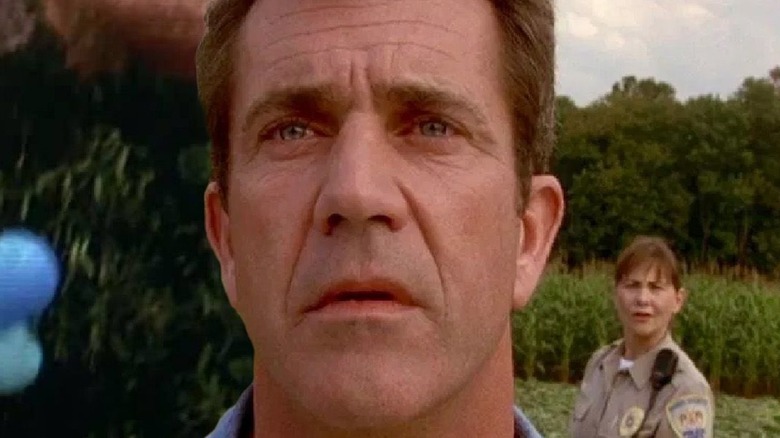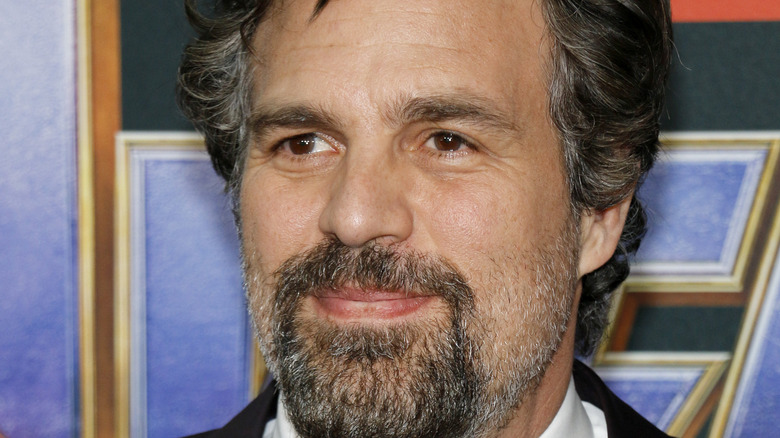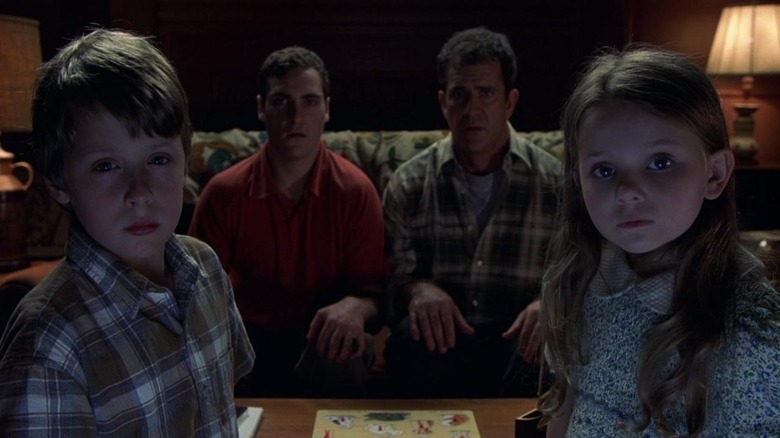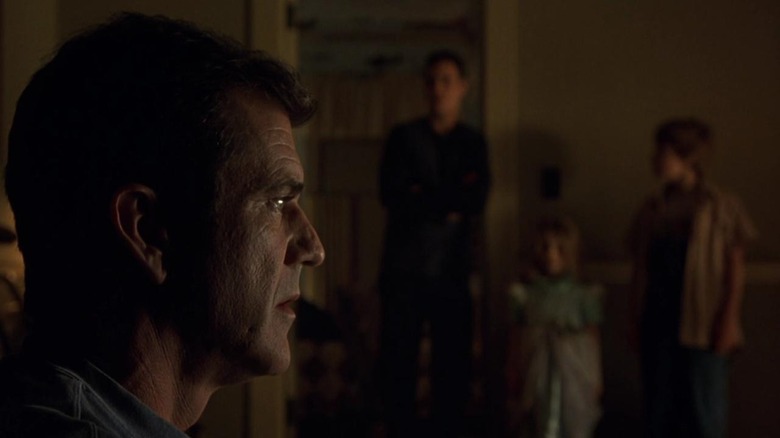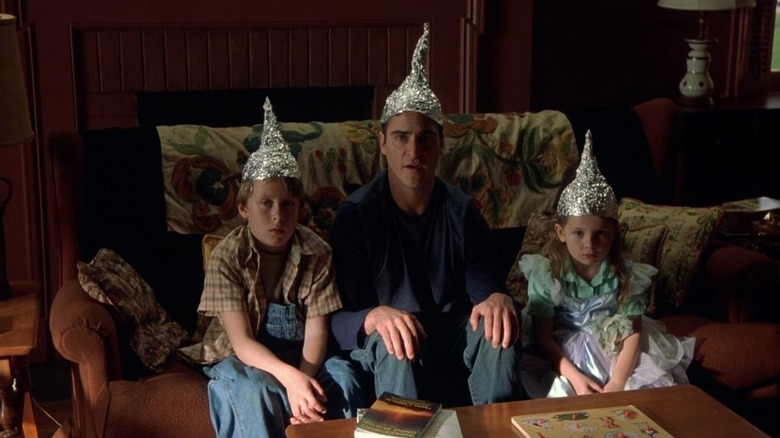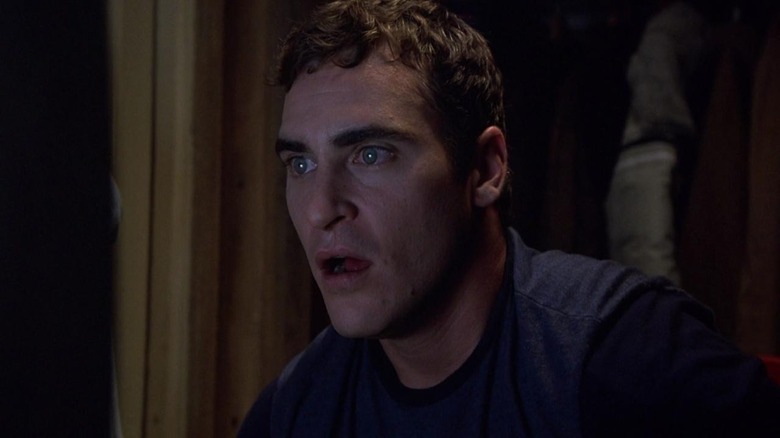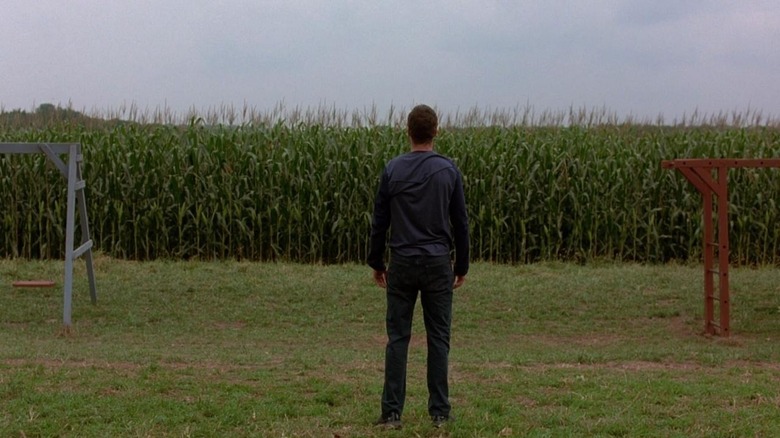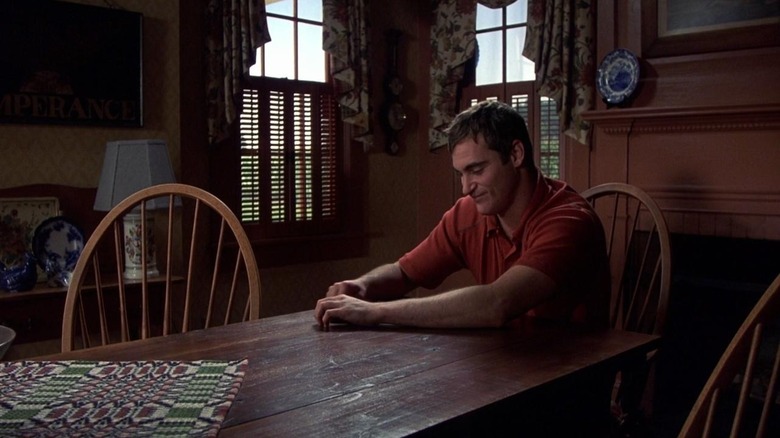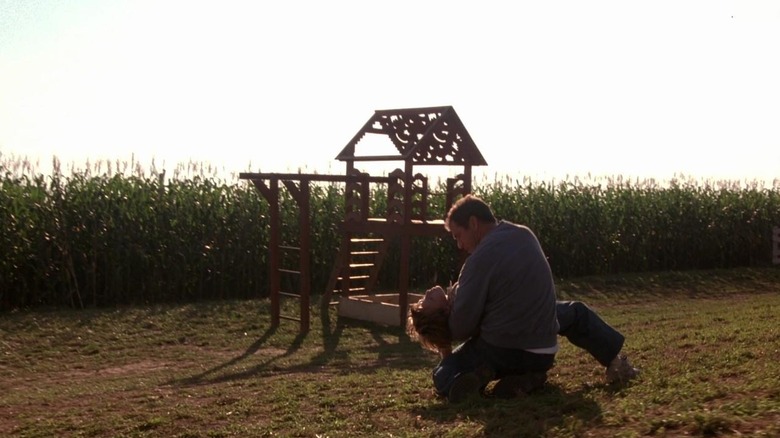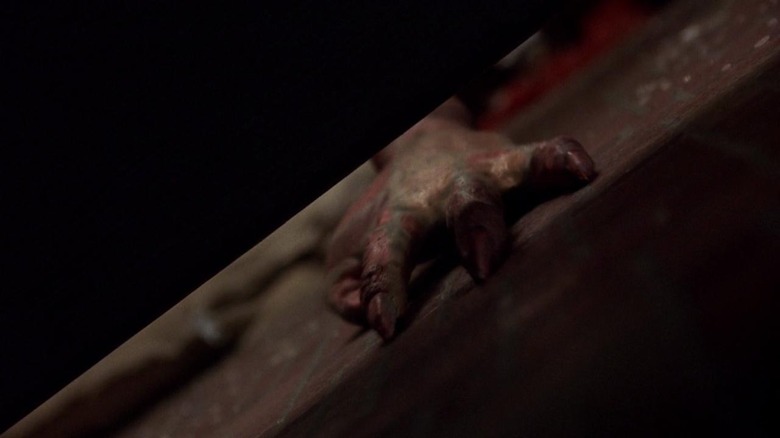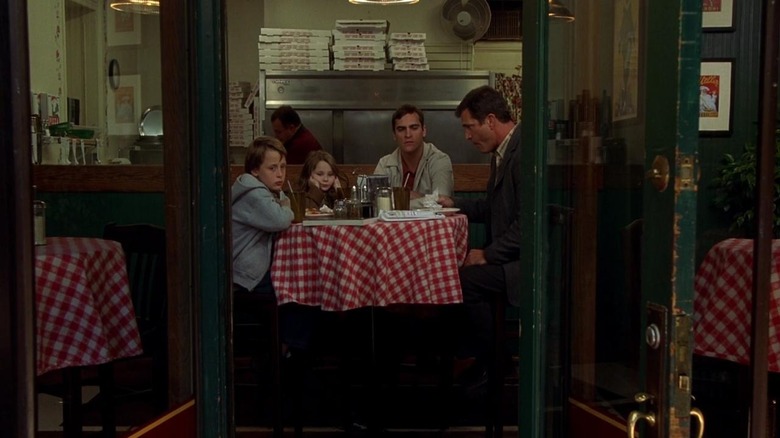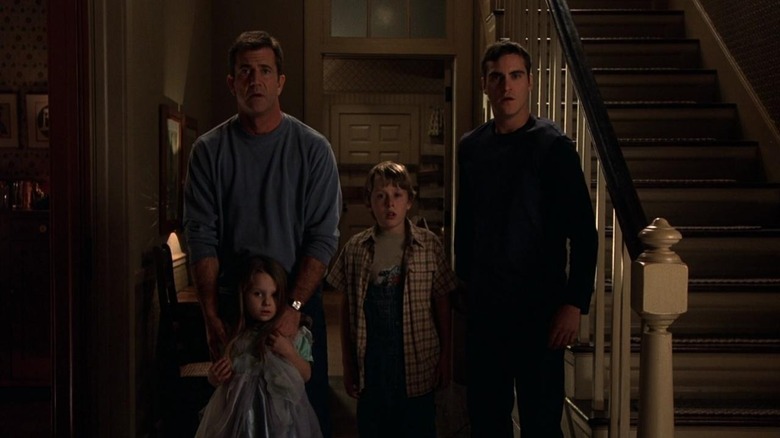The Untold Truth Of Signs
After "The Sixth Sense" and "Unbreakable," all eyes were on M. Night Shyamalan's 2002 film "Signs." This was a pivotal movie, especially since "Unbreakable" had a lackluster box office result compared to the runaway success of "The Sixth Sense." This project was also critical in how it wouldn't feature Bruce Willis, the leading man in Shyamalan's last two movies, not to mention that it was shrouded in secrecy before its release. A lot was riding on "Signs" and it wasn't always assured that the project would break out with moviegoers. Such uncertainty sounds preposterous now, of course, given the fact that "Signs" turned into a smash hit at the box office and even scored positive marks from critics. Instead of being a sign that Shyamalan was a one-hit wonder, "Signs" was an indicator that this promising new auteur could still produce something that resonated deeply with the moviegoing public.
Though "Signs" is ubiquitous now, it's still got — much like those crop circles — plenty of secrets shrouded in mystery. The untold truth of "Signs" covers everything from how an "Avengers" star was originally supposed to play one of the lead roles to the personal importance of "Signs" to Shyamalan to even how this filmmaker attempted to make sure this movie's twists emerged organically in the story. Even if you've seen "Signs" too many times to count, the untold truth of this M. Night Shyamalan feature will still deliver plenty of shocks and surprises.
Mark Ruffalo was supposed to be in Signs
In the days before he began portraying Bruce Banner aka the Hulk in the Marvel Cinematic Universe, Mark Ruffalo was a go-to character actor in indie dramas and other low-budget challenging projects. However, even before he took on the part of an enormous green rage monster, Ruffalo wasn't opposed to appearing in larger-scale features. After all, he had supporting roles in major genre movies like "Shutter Island" and "Collateral." These forays would've also included, at one point in time, taking on the principal role of Merrill Hess in "Signs."
Ruffalo had signed on to portray the role in "Signs," and the mind reels to imagine what kind of performance Ruffalo would've delivered working with Shyamalan. However, this promising pairing of actor and filmmaker was not meant to last. Tragedy struck the feature just before shooting began when Ruffalo had to undergo an operation to remove a cyst in his ear. While this procedure went off without a hitch for Ruffalo physically, it did ensure that the actor's recovery time would not be finished before "Signs" began shooting. Thus, Ruffalo had to drop out. It was a setback for the motion picture, though not a fatal one, as "Signs" was eventually able to procure Joaquin Phoenix to portray the character instead. While the character of Merrill Hess still ended up being portrayed by an acclaimed dramatic performer, it wasn't the actor Shyamalan had in mind for the part initially.
Why crop circles resonated with Shyamalan
Crop circles and the alien-based conspiracy theories surrounding them have been around for ages. For some filmmakers, the longstanding nature of this phenomenon might turn them off from making this concept the center of a movie. After all, if mysterious crop circles have been around for so long, what else can you say about them? But speaking to Blackfilm, Shyamalan noted that the universality of crop circles was the exact reason he wanted to make a movie about "Signs." This whole concept being something that everyone around the world was aware of made it seem like a great element to build an entire globally appealing thriller around.
Shyamalan even, at one point, considered opening "Signs" in a manner that would've reminded audiences of just how ubiquitous the crop circle phenomenon is. This opening sequence would've depicted a family in an unspecified location in India going outside and discovering a crop circle. During this sequence, the father of the family would suddenly become Mel Gibson, and the audience would be thrust into Philadelphia, where the same bizarre occurrence was happening. Creating visual parallels between two unconnected families would've shown how widespread the crop circles had become. While this sequence went unrealized, it did epitomize the universality of crop circles that drew Shyamalan to them in the first place.`
The importance of sound in Signs
Moviegoers have been conditioned to recognize sound only when it's happening in big splashy contexts. An explosion will get one to notice the sound mixing, the same for rapid gunfire. But this component of filmmaking is just as important for intimate titles as it is for the biggest blockbusters. Just take a look at "Signs," a movie where sound is critically important, particularly when it isn't around. "Signs" primarily takes place around an isolated farmhouse. It's a place so removed from the loudness of the city that the rustle of corn in the backyard can be heard for miles around. The quietness of "Signs" meant that every sound had to be carefully constructed, a fact that was not lost on Shyamalan when crafting the movie.
In an interview with UPI, Shyamalan noted that his guiding star for the sound work in "Signs" was to mold it like dialogue or special effects, something that can propel the story forward or reveal new layers to the character. He even went so far as to say, "it's my special effects for 90% of the movie." His attention to detail on this aspect of the movie was so severe that he recalled that he and the crew plowed through countless iterations of a wind chime until they found the perfect version of that noise for the movie. Similar levels of intricate detail were applied to figuring out what kind of language the aliens would speak. All of this effort ensured that the sounds of "Signs" could inform some of its most frightening sequences.
The rapport between Shyamalan and Mel Gibson
M. Night Shyamalan's fascination with "Signs" leading man Mel Gibson stretched back to way before they ever started collaborating on this sci-fi thriller. In a UPI interview, Shyamalan recalled a fond memory of being transfixed by Gibson's performance the first time he watched "Lethal Weapon." Contrary to his expectations of what an action movie performance could be, Shyamalan was blown away by the emotional tangibility and authenticity Gibson brought to his performance. This was not the wooden leading man turn Shyamalan expected from this genre; this was something special. As Shyamalan put it, "this guy did stuff emotionally that had no business being in an action movie. I completely believed the humanity of a man who was so torn up about losing his wife that he wasn't afraid of dying, which made him a lethal weapon, and those steps were profound."
While Shyamalan was floored by Gibson in his younger years, this actor got to feel the same way about Shyamalan once he got a chance to read the screenplay for "Signs." Speaking to BBC, Gibson remarked that he often looked for a handful of things in potential acting projects: "to entertain, to educate and, if possible, take you to a higher plane." Gibson realized that "Signs" was going to accomplish all of these things and quickly signed onto the project. With this development, "Signs" not only got a big-name actor to anchor its cast, but Shyamalan got a chance to direct the man who once dazzled him in "Lethal Weapon."
The personal importance of Signs
In an interview with UPI, M. Night Shyamalan revealed that, though faith is often a prominent part of his movies, he's not a traditionally faithful person. Rather than be slavishly devoted to one religion, Shyamalan uses his films to reflect his various musings and approaches to the very concept of faith. For "Signs," he found that creating a lead character who is "waking up to his potential and who he is and the things around him" ended up encapsulating his thoughts on faith at the time that he was writing "Signs."
Making a movie about the necessity of clinging to faith serves as an interesting hopeful contrast to how faith has cropped up in other Shyamalan films. Specifically, "Unbreakable," made directly before "Signs," sees the main character's faith in Mr. Glass shattered once he learns that this man was responsible for the train crash that revealed his superpowers. Holding faith in someone else only led to bitter disappointment in "Unbreakable," whereas faith is what saves the day in "Signs." This variety in approaches to faith doesn't just ensure that Shyamalan's movies can stand apart. They also lend fascinating insight into the man's complicated and ever-shifting relationship with faith.
Shyamalan felt that Signs was more emotional than his past films
There's no denying that there are some overlapping similarities between three of M. Night Shyamalan's films. "The Sixth Sense," "Unbreakable," and "Signs" all prominently feature children who have strained relationships with their parents, while a spiritual quality exists to a varying degree across all these movies. Plus, they all feature a style of dialogue that's come to be known as distinctly the work of Shyamalan. However, in Shyamalan's opinion, "Signs" managed to separate itself from his earlier works simply by being a much more emotional creation.
Speaking to Blackfilm, Shyamalan was upfront about how emotional he can be as a person, which informs how much poignancy plays into his works. However, one of his earlier efforts, "Wide Awake," got pummeled by critics and moviegoers for its unabashedly sentimental qualities. While Shyamalan didn't agree with these critiques, they did inspire him to pull back on his emotions for his subsequent directorial efforts. Having proven himself as a filmmaker with "The Sixth Sense" and "Unbreakable," he decided it was time to get back to his comfort zone of writing movies that wear their emotions on their sleeves with "Signs." While acknowledging that being so forward with your movie's emotions can turn off audiences, going this route made "Signs" something deeply personal to Shyamalan and ensured it could immediately differentiate himself from his prior filmmaking efforts.
Signs was the first major Hollywood movie to resume shooting after 9/11
"Signs" was a momentous motion picture in a tragic way that nobody involved in the production of this movie could've seen coming. "Signs" ended up being one of the first major Hollywood productions to start shooting after the September 11, 2001, terror attacks. Filming on features had briefly ground to a halt with all the uncertainty looming in the air in the entertainment industry. Now "Signs" was the canary in the coal mine to help figure out what shooting American movies even looked like in the wake of such unspeakable horrors. It was an experience that M. Night Shyamalan still remembers clearly years after the shooting finished.
Speaking to The Ringer in January 2020, Shyamalan recalled both how so much of the crew of "Signs" hailed from New York and how he felt overwhelmed trying to lead people at his age in such an unimaginable moment in history. Though the screenplay for "Signs" was written long before 9/11, Shyamalan, with the benefit of hindsight, felt that "Signs" was molded by the public psyche in the wake of the national tragedy. There was a sense of sorrow and uncertainty lingering over everybody, which helped inform the thriller aspects of "Signs," while its poignant moments of family members bonding felt all the more resonant after this tragic reminder of how easily families can be torn apart. 9/11 reverberated throughout "Signs," even how it made history when it started shooting.
The nebulous quality about Shyamalan that fascinated Joaquin Phoenix
Some directors attract notable actors because of very concrete parts of their creative process. Part of the attraction of working with Quentin Tarantino as an actor, for instance, would be getting to handle his distinctive brand of dialogue. Similarly, performing in a Terrence Malick film would offer unique challenges related to not knowing the whole story of the movie you're in while you're on set. In talking about M. Night Shyamalan to Entertainment Weekly, "Signs" actor Joaquin Phoenix noted that he couldn't pinpoint what made the filmmaker so compelling. However, being unable to name that quality wasn't an issue for Phoenix.
On the contrary, Phoenix enjoyed how undefined Shyamalan was on the set. "I trusted him, but I can't really put my finger on why," Phoenix explained. "There was just something in his eyes. I've thought about this a number of times. It's been a year and I can't say specifically what it is about Night." Even if the specific qualities that made Shyamalan so fascinating to Phoenix remained nebulous to this actor, it's clear Shyamalan emerged as somebody Phoenix could lean on while making a movie as intense as "Signs." Sometimes, that steadiness is all you need to lure in big-name talent to your movie.
What inspired Signs in the first place
Speaking to The Ringer, M. Night Shyamalan noted that "Signs" originated not as one movie, but from two separate concepts. The first of those concepts involved a crop circle being discovered by a family right outside their house, while the other involved a movie chronicling the apocalypse "from the perspective of a house." Combining these notions inspired the story of "Signs." However, the tone of "Signs" came from a different place right after Shyamalan's "Unbreakable" came out. This was a movie that the director considered to be much darker, a bleaker affair that may have turned off audiences with its dreary nature.
Shyamalan contemplated this idea one day when he went to eat at a Denny's and he began to look around at the people inside the eatery. Everyone he saw was silent and seemed to be working through heavy stuff. Realizing that these individuals were the target demo for his movies, he decided that his next project after "Unbreakable" would be lighter and more hopeful. This is when he committed to "Signs" fulfilling those tonal ambitions. While the final product would have scares and thrills, Shyamalan was now going full steam on making sure "Signs" wasn't all doom and gloom. "Signs" came together from several disparate ideas and real-world experiences, but they all coalesced to make something cohesive and compelling.
How Shyamalan and James Newton Howard cracked the score for Signs
Throughout the works of director M. Night Shyamalan made before 2015, a constant fixture has been composer James Newton Howard. This musician, who has been nominated for nine Academy Awards (including for Shyamalan's 2004 film "The Village"), has stuck around for good reason in Shyamalan's filmography given what consistently interesting compositions he delivers. The atmosphere of the greatest Shyamalan films, such as "The Sixth Sense" and "Unbreakable," is substantially enhanced by the intense melodies that also provide potent insight into the mindsets of the on-screen characters. Not surprisingly, such impactful collections of music are the result of lots of collaboration between Shyamalan and Howard.
Speaking to The Ringer, Shyamalan talked about how he and Howard had started the score for "Signs" by deciding to base it on the works of Bernard Herrmann — specifically in having a score "that's meant to be seen — it's visual, and it's on top of the movie." This decision to go grand on the score was accompanied by Shyamalan taking Howard through the storyboards for "Signs" so that this musician could get a sense of the visual style of the feature. Howard ended up writing a piece of music for "Signs" during pre-production that ended up serving as the music for the opening credits and inspired the tone for the ensuing movie. The deep relationship and creative rapport between Shyamalan and Howard before "Signs" had shot a frame of footage helps explain why the movie's score ended up being so memorable.
The way Shyamalan tried to organically set up twists in Signs
The movies of M. Night Shyamalan have become famous for their twists. However, the best instances of unexpected turns in this man's work have been ones that function beyond their shock value. The twists at the end of "The Sixth Sense" and "Unbreakable," especially, deepen the movie audiences just watched and beg for viewers to revisit the entire feature in a new light. In other words, these twists enhance the characters rather than reducing them to pieces in an elaborate carnival show. For "Signs," Shyamalan attempted to remember this method by crafting a script that could make the major twists in the climax feel organic, not contrived.
Speaking to The Ringer, Shyamalan noted that, as a human being, he's always aware of how elements of his past, like a conversation with his wife, are impacting him in the here and now. For the twists at the end of "Signs," he tried to channel this phenomenon by having the ways to defeat the alien antagonist build upon earlier lines of dialogue from the adolescent character and the protagonist's deceased wife. What seemed like just ramblings from a dying person or peculiar behavior from a child ended up meaning much more than that in the long run. The twists, then, become natural extensions of the behavior of the characters rather than just an obligatory element in the movie meant to live up to Shyamalan's pop culture persona.
The massive box office run of Signs
With "The Sixth Sense," M. Night Shyamalan had established himself not just as a filmmaker of note, but also as somebody who could attract moviegoers from all over the planet. Making over $290 million domestically, "The Sixth Sense," in the one downside to its box office run, ended up casting a long shadow over any future Shyamalan movie's box office performance. It'd be impossible for nearly any other feature he'd create to match the gargantuan financial success of this breakthrough title. Though "Signs" wasn't quite as big as "The Sixth Sense," it still managed to become a very impressive box office performer in its own right.
In its domestic run, "Signs" grossed $227.9 million, a massive amount that put it as the biggest movie Mel Gibson has ever acted in by a considerable margin and the only film he's appeared on-screen in that exceeded the $200 million mark in North America. With an additional $180.2 million internationally, "Signs" grossed $408.2 million globally, a significant haul that made it considerably profitable on a $70.7 million budget. The massive success of "Signs" was made evident by where it ended up ranking among all 2002 titles at the box office. This Shyamalan feature was the seventh-biggest movie of 2002 worldwide and the sixth biggest of the year in North America. It may not have been quite as big as "The Sixth Sense," but "Signs" still packed a wallop financially.
